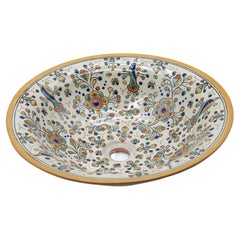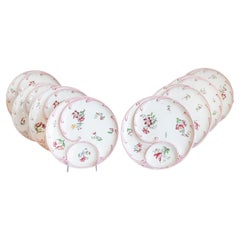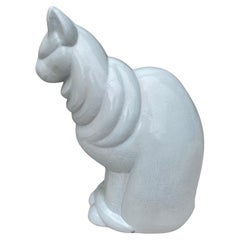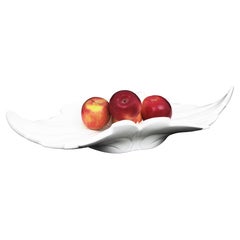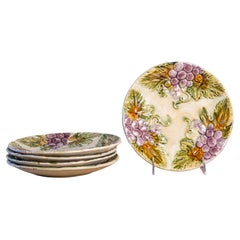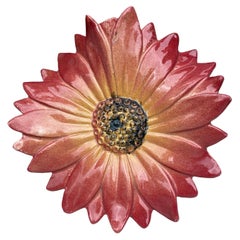Majolica Furniture
21st Century and Contemporary Mexican Spanish Colonial Majolica Furniture
Ceramic, Clay, Majolica
19th Century French Antique Majolica Furniture
Majolica
1930s French Art Deco Vintage Majolica Furniture
Ceramic, Faience, Majolica
20th Century Spanish Mid-Century Modern Majolica Furniture
Majolica, Pottery, Ceramic
19th Century French Antique Majolica Furniture
Majolica
1890s French Art Nouveau Antique Majolica Furniture
Ceramic, Faience, Majolica
1920s French Vintage Majolica Furniture
Ceramic, Majolica
Late 19th Century English Late Victorian Antique Majolica Furniture
Majolica
21st Century and Contemporary Italian Majolica Furniture
Ceramic, Earthenware, Majolica
1890s French Country Antique Majolica Furniture
Majolica, Ceramic
19th Century English Victorian Antique Majolica Furniture
Majolica
19th Century French Victorian Antique Majolica Furniture
Majolica
1950s French Rustic Vintage Majolica Furniture
Ceramic, Faience, Majolica, Pottery
1880s French Napoleon III Antique Majolica Furniture
Majolica, Ceramic
21st Century and Contemporary Mexican Spanish Colonial Majolica Furniture
Clay, Ceramic, Majolica
Mid-20th Century Italian Mid-Century Modern Majolica Furniture
Ceramic, Majolica
1950s French Mid-Century Modern Vintage Majolica Furniture
Ceramic, Faience, Majolica
Early 1900s French Art Nouveau Antique Majolica Furniture
Ceramic, Faience, Majolica
Early 20th Century European Majolica Furniture
Majolica
1930s French Country Vintage Majolica Furniture
Ceramic, Majolica
Late 19th Century Victorian Antique Majolica Furniture
Majolica
1870s English Victorian Antique Majolica Furniture
Majolica
Early 1900s French French Provincial Antique Majolica Furniture
Majolica
1880s French Victorian Antique Majolica Furniture
Ceramic, Faience, Majolica
1870s French Victorian Antique Majolica Furniture
Majolica
Mid-19th Century French Antique Majolica Furniture
Majolica, Porcelain, Faience
Late 19th Century Victorian Antique Majolica Furniture
Majolica
Mid-20th Century Italian Mid-Century Modern Majolica Furniture
Ceramic, Majolica
1950s French Mid-Century Modern Vintage Majolica Furniture
Ceramic, Faience, Majolica
1930s French Art Nouveau Vintage Majolica Furniture
Majolica
1880s French Victorian Antique Majolica Furniture
Ceramic, Faience, Majolica
Mid-20th Century French Majolica Furniture
Ceramic, Majolica
19th Century English Victorian Antique Majolica Furniture
Majolica
1860s Antique Majolica Furniture
Majolica
Early 1900s German Art Nouveau Antique Majolica Furniture
Majolica
1880s British Victorian Antique Majolica Furniture
Ceramic, Faience, Majolica
Late 19th Century French Antique Majolica Furniture
Majolica, Porcelain
1880s French Rustic Antique Majolica Furniture
Ceramic, Faience, Majolica
1860s Antique Majolica Furniture
Majolica
Early 1900s French Country Antique Majolica Furniture
Ceramic, Faience, Majolica
Mid-17th Century Dutch Baroque Antique Majolica Furniture
Ceramic, Faience, Majolica
Mid-20th Century French Mid-Century Modern Majolica Furniture
Majolica, Ceramic, Faience, Pottery
Early 20th Century French Art Nouveau Majolica Furniture
Gold
21st Century and Contemporary Italian Classical Greek Majolica Furniture
Ceramic, Faience, Majolica
1890s French Victorian Antique Majolica Furniture
Ceramic, Majolica
1870s Great Britain (UK) Victorian Antique Majolica Furniture
Majolica
1890s Belgian Rustic Antique Majolica Furniture
Majolica, Ceramic
21st Century and Contemporary Italian Renaissance Revival Majolica Furniture
Ceramic, Majolica, Faience
1880s Antique Majolica Furniture
Majolica
1880s French Rustic Antique Majolica Furniture
Ceramic, Faience, Majolica
Early 1900s French French Provincial Antique Majolica Furniture
Majolica, Ceramic
1870s French Victorian Antique Majolica Furniture
Ceramic, Majolica
1890s French Art Nouveau Antique Majolica Furniture
Ceramic, Majolica
Early 18th Century Italian Folk Art Antique Majolica Furniture
Majolica
1870s English Victorian Antique Majolica Furniture
Majolica
1870s English Victorian Antique Majolica Furniture
Majolica
Late 19th Century French Antique Majolica Furniture
Ceramic, Majolica
1880s English Antique Majolica Furniture
Majolica, Pottery
20th Century Italian Majolica Furniture
Ceramic, Earthenware, Majolica
1870s French French Provincial Antique Majolica Furniture
Ceramic, Faience, Majolica
Antique and Vintage Majolica Platters, Pottery and Other Furniture and Decor
The popularity of Victorian majolica, the gaily colored, metallic-oxide-glazed earthenware, has ebbed and flowed for more than a century. Right now, antique and vintage majolica plates, pitchers, decorative objects and other pieces appear to be having a moment — again.
Starting in the 1850s, people in the U.S. and the U.K. embraced these affordable housewares with unusual polychrome palettes (turquoise and pink) and whimsical forms (candlesticks shaped like dolphins). By the 1870s, majolica was being mass-produced for an ever-expanding middle class in countries like England, France, Sweden, Hungary and Portugal. Majolica was Art for Everyman. Its popularity coincided with interest in exotic Japonisme and scientific studies by the likes of Carl Linnaeus, Charles Darwin and John James Audobon.
Despite a similarity in name, Victorian majolica is significantly different in subject matter and form from its Italian forebear, Renaissance maiolica. That earlier earthenware bore gaily painted religious and mythological scenes, and unlike majolica, with its lively contours, was not molded or three dimensional.
What was the attraction of majolica for the 19th-century collector? “Imagine what it looked like in a Victorian interior, with dark woods, heavy drapes and upholstered chairs and sofas,” says Susan Weber, founder of the Bard Graduate Center in New York. “Majolica is robust and extremely tactile. With its naturalistic shapes, colorful glazes and often humorous themes, it appealed to the growing consumer society.”
In England, manufacturers like Minton began to produce decorative, relief-molded majolica tiles for the interiors of taverns, train stations, even the famous Queen’s Dairy at Frogmore, on the grounds of Windsor Castle. In 19th-century France, Sèvres and smaller ceramics firms began to reinterpret the snake-decorated platters made by Bernard Palissy, a 16th-century self-taught French potter. The result was a type of majolica called Palissy ware, which, like the originals, was festooned with odd creatures (lobsters, lizards and snakes) modeled by hand.
The late Moroccan-born, Paris-based decorator Alberto Pinto often placed Palissy ware in his clients’ living rooms, posing individual pieces on brackets against a background of stamped, gilded leather. Pinto, in turn, influenced such contemporary decorators as Harry Heissmann of New York. After 1900, people got swept up in the romanticism of Art Nouveau and ceased buying majolica. The 1970s saw a revival of interest, and in 1982, the Cooper Hewitt, Smithsonian Design Museum, in New York, organized “English Majolica,” an exhibition featuring 75 examples from Minton, Wedgwood and George Jones, among other makers.
On 1stDibs, find antique and vintage majolica tea sets, vases, candlesticks, tureens and other furniture and decorative objects.
